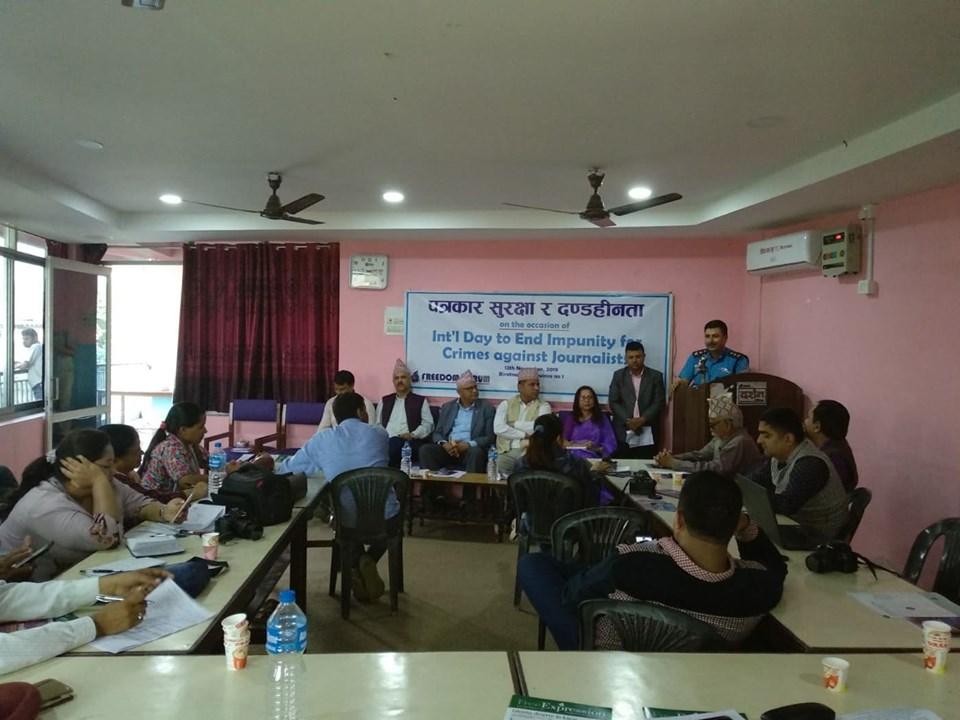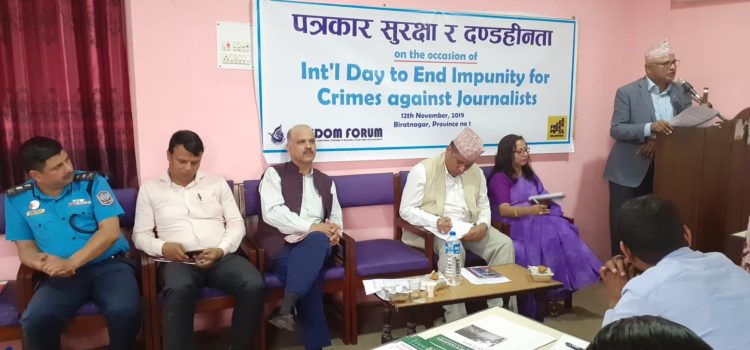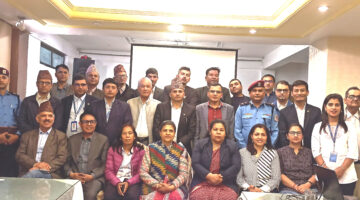Freedom Forum organized a program marking the International Day to End Impunity for Crimes against Journalists in Biratnagar city of Province 1 on November 11.
On the occasion, FF Executive Chief Taranath Dahal
The Day is marked in memory of the journalists killed en masse in Philippines in 2009. Later, in recognition to the advocacy made by the rights bodies for justice and commemoration of the journalists killed, the UN announced November 2 as a day to end impunity for crimes against journalists.
In this connection, FF is conducting this campaign across the country, drawing attention of stakeholders including government, police, human rights defenders and security agencies and law enforcement agencies
The objective of the day is to review the challenges being faced by journalists for their works and create pressure to enable env ironment conducive for journalists. It is also to demand commitment from stakeholders to ensure safe working environment for journalists.
ironment conducive for journalists. It is also to demand commitment from stakeholders to ensure safe working environment for journalists.
As there is new setup of province government in Nepal, it is right time to put the things in place. Province government may take the agenda seriously and develop concerned mechanisms and strategic priorities on defending press freedom and creating working environment for journalists.
Reminding the government of its responsibility for defending media freedom and ending impunity is the thrust of the program. It is the citizen right which is directly related to development. It is the duty of the governments to address the development needs as well.
Still, journalists are facing threats so censorship aggravated by fearful working environment is still prevailing high in the province. Government attention was drawn on the attacks and atrocities but no response has been made yet.
FF is documenting the impunity for crimes against journalists in Nepal. Let’s discuss the issue and hope it will help set different tiers of the governments the priorities and create synergy of CSO, media freedom organizations, security agencies and government for resolution. This is to enable coordinated environment to address the problems being faced by media while exercising their freedom of expression and media freedom.
Minister for Internal Affairs and Law, Hikmat Karki
Local body is mandated to regulate local media and we are working to develop mechanisms for creating environment to cover the news and build opinions. Safe environment for freedom of expression and right to information is the responsibility of local government so we are focusing on local and provincial governments.
National commitment for SDGs and several programs are being made. SDG goal 16.10.1 is safety of journalists. No journalists should be the subject of attacks and harassments while carrying out their duty to inform the public. Journalists would not be subjected to threat while writing fact-based news. Even they are free to make healthy criticism of the duty bearers as it creates pressure on the elected people representatives to improve their performances.
Province-1 General Secretary of FNJ, Bibek Gautam
State involved crimes against journalists are not well-reported and obviously not put forward for legal recourse. Itahari mayor Dwarika Lal Chaudhary’s blatant threat to journalist was one of the recent examples showing the situation of press freedom. FNJ mission took place and suggested the victim to go for legal recourse in the case.
Threat to journalist physical and professional safety are increasing and the state of self-censorship is still on. Positive censorship is also taking place which has also shrunk the space of professional and investigative journalism. Incentives to journalists and political appointments as advisors to people representatives has affected the delivery of true news and objective journalism.
The state apparatus are still involved in creating fear against journalists. Families are still not receiving justice. Need to remind the state mechanisms.
Bandhu Pokharel, FNJ, Morang Chair:
Media is sometimes more stronger than political parties. Struggle for democracy and freedom is still on. We assume that the partn ers for democracy may not threaten journalism. We think that the political parties which were the ally in the fight for democracy and rights now are maintaining indifference to press freedom and freedom of expression.
ers for democracy may not threaten journalism. We think that the political parties which were the ally in the fight for democracy and rights now are maintaining indifference to press freedom and freedom of expression.
Those who were in the campaign in the past are in power and we at least think they would not issue threat to media freedom. But this is not happening.
District Police Office Chief, Superintendent of Police, Biswo Adhikari
Media is recognized as the fourth estate and respected for its watchdog role. Our country has the best laws but practice is a trouble. Media vigilance on police is welcomed but it should be constructive.
Impunity is the failure of regime and governance. Nepal Police is committed to provide security to journalists and people. The Morang Police have booked the perpetrators involved in gagging press freedom in Morang. Such proactive measures have created environment for journalists to report the issues.
FNJ Province 1 Chair Bikram Luitel
Two types of threats – physical and psychological – are still marring journalists to exercise their media freedom. Itahari municipality Mayor issued threat but all remained silent. Neither the ruling political parties nor the government took stern action against him. The ruling party did not even ask a single question. Press freedom violation incidents are decreasing because we are not writing any news against local government and we are taking some incentives from local government.
Under the camouflage of monetary benefits, there is no journalism and so there is no threat. We are also reviewing our role and are doing our job in a way to strengthen the federal setup.
Only 18 news stories were covered against rulers of Province 1 in three years. Though there are several issues we are not writing this thinking that the new political structure should be strengthened.
Self censorship and impunity are looming large. State sponsored facilities to journalists have undermined the professional performance of journalists. State threats are increasing. We should work to caution local governments.
Local level is making laws and is using it as weapon to threaten media. Trends including closure of media house are also visible. Legal aid is a must for journalists in trouble.
INSEC Province 1 Chief, Som Raj Thapa
End impunity is to end the culture of crimes and impunity. The crimes against journalists are increasing according to INSEC human rights year book. Not only police but other state mechanisms are also hostile to media freedom. Criminalization of politics and politicization of crimes havev created trouble. Voice against such trend has become a major challenge.
Making state apparatuses accountable is a must as the incidents against journalists in democratic era is a shame. Efforts from all sides are imperative to end impunity.
National Human Right Commission Province-1 Acting Chief Tika Dahal
NHRC is also monitoring the status of human rights violation including media freedom. It also issues press alerts and statements. The human rights watchdog body also developed a guideline on defending freedom of expression. The mechanism has representation from different ministries so it is likely to work.
Biratnagar Metropolis Mayor Bhim Parajuli
We are committed to defending media freedom and ending the related impunity. I know the pain and plight of journalists as I used to practice journalism. There are high risks to journalists from physical and psychological aspects. State should enable environment for journalists to work in a confident and safe manner. All three tiers of governments should come up with a special package to secure journalists’ rights. Punishment to journalists for news reporting is wrong. I request journalists to do investigative journalism. Democracy does not thrive in the absence of free media.
———



